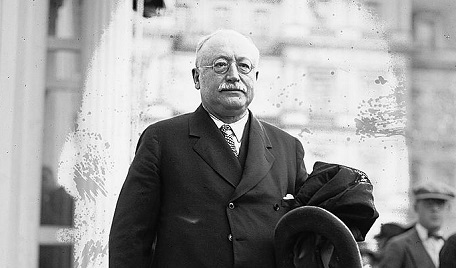An obscure incident involving the 14th Amendment’s Disqualification Clause is getting some new attention in the lead-up to Supreme Court arguments about former President Donald Trump.
 On February 8, 2024, the Court will consider Trump v. Anderson, a case that arrived on an expedited basis. The question before the justices is “whether the Colorado Supreme Court erred in ordering former President Donald Trump excluded from the 2024 presidential primary ballot.”
On February 8, 2024, the Court will consider Trump v. Anderson, a case that arrived on an expedited basis. The question before the justices is “whether the Colorado Supreme Court erred in ordering former President Donald Trump excluded from the 2024 presidential primary ballot.”
The Colorado Supreme Court’s decision found that Trump was not eligible to be placed on the state’s presidential election ballot since the Constitution’s 14th Amendment bars people who take a constitutional oath and then are part of an insurrection from holding federal office. The decision was stayed pending action at the U.S. Supreme Court.
Podcast: Should President Trump Be Allowed on the 2024 Ballot?
Among the many precedents and legal questions posed in the briefs for Trump v. Anderson are fleeting references to one public debate after the Reconstruction era on the Disqualification Clause: the House’s refusal in 1919 and 1920 to seat Victor L. Berger, an elected representative found guilty under the Espionage Act. A near-unanimous House voted twice that Berger could not serve after two elections based on several factors, including the 14th Amendment’s Disqualification Clause. Berger later served three terms in Congress during the 1920s.
And while the Trump and Berger situations are different, the extensive House debates over Berger and his constitutional rights raise some insight about how lawmakers viewed the 14th Amendment’s Section 3 more than a century ago.
The Berger Case
Victor L. Berger was the first Socialist party member elected to the House of Representatives. Born in Austria, Berger came to the United States at the age of 18 and settled in Milwaukee, where he published several Socialist Party newspapers and was a party leader. Berger won election to the House of Representatives in 1910 and was not re-elected in 1912. During the World War I period, Berger publicly opposed the war in his newspaper, The Milwaukee Leader.
Berger and several other Socialist Party leaders were indicted in federal court in March 1918 under the Espionage Act. Berger was cited for six newspaper articles that "encouraged disloyalty and interfered with recruiting for the military." His newspaper also lost its post office privileges.
Town Hall Video: From Spies to Leakers: The History of the Espionage Act
Undaunted, Berger ran for the Senate unsuccessfully in April 1918, but he won a three-person race for the House’s heavily German-American Fifth District seat in November 1918, while he was under federal indictment.
In January 1919, Judge Kenesaw Mountain Landis found Berger and his fellow defendants guilty of obstructing the nation’s war efforts, and they were sentenced to between four and 20 years in federal prison. Berger immediately appealed to the Seventh Circuit court and made bail. In May 1919, Berger appeared at the House of Representatives to take his oath of office. Instead, House Elections chair, Representative Frederick Dallinger of Massachusetts objected, and the House passed a resolution suspending Berger until a special committee was able to serve.
The special committee decided on May 26, 1919, to consider if Berger violated Section 3 of the 14th Amendment, which barred those who had “having previously taken an oath, as a member of Congress” from serving if they had “engaged in insurrection or rebellion against the same or given aid or comfort to the enemies thereof.”
The Arguments on the 14th Amendment and the First Amendment
 On June 11, 1919, committee hearings began, with Milwaukee attorney Henry Cochems representing Berger, and Dallinger chairing the nine-person House committee. Cochems quickly brought up the issue of the 14th Amendment as the sole question in front of the special committee. Dallinger responded that Berger’s alleged violations of the Espionage Act of 1917 were also a factor for the House to consider.
On June 11, 1919, committee hearings began, with Milwaukee attorney Henry Cochems representing Berger, and Dallinger chairing the nine-person House committee. Cochems quickly brought up the issue of the 14th Amendment as the sole question in front of the special committee. Dallinger responded that Berger’s alleged violations of the Espionage Act of 1917 were also a factor for the House to consider.
Cochems then argued that the Amnesty Act of 1898, which removed the disability from office of about 750 remaining Confederate soldiers, actually repealed all of Section 3 of the 14th Amendment, since it only applied to actions related to the Civil War. Dallinger was skeptical. “Do I understand you that you contend that [act] repealed the entire Section 3 of the 14th Amendment?” Dallinger asked. Cochems replied that there was “no doubt. The other argument made by Berger’s attorney was that the House could not deny a seat to a representative if he arrived with an official state election certificate. Once taking the oath, the new House member could only be expelled by a two-thirds majority vote.
Cochems' two arguments were not successful. The committee’s majority report in October 1919 stated that “both of these contentions are unsound and are not supported either by principle or by precedent. … The contention that Section 3 of the Fourteenth Amendment to the Constitution is no longer applicable, is not worthy of serious consideration.”
The House Committee also discarded First Amendment arguments based on several recent Supreme Court decisions, including Sugarman v. United States and Schenck v. United States.
"It was argued at great length, both by Mr. Berger and his counsel, that his conviction at Chicago and any attempt to deprive him of his seat in Congress would be a violation of the freedom of speech and the press guaranteed by the First Amendment to the Constitution of the United States," the majority report noted. The committee quoted Justice Oliver Wendell Holmes Jr.’s opinion in Schenk: “When a nation is at war, many things that might be said in time of peace are such a hindrance to its effort that their utterance will not be endured so long as men fight and that no court could regard them as protected by any constitutional right.”
The committee recommended that “if the House is satisfied that Representative-elect Berger did give aid or comfort to the enemies of the United States, he is ineligible to a seat in this House, and it is not only the right but the constitutional duty of the House to exclude him.”
On November 10, 1919, Speaker of the House Frederick Gillett asked for a vote on the following motion: "That under the facts and circumstances of this case Victor L. Berger is not entitled to take the oath of office as a Representatives in this House from the Fifth congressional district of the State of Wisconsin, or to hold a seat therein as such Representative.” The House found Berger ineligible in a 311-1 vote.
Berger Returns to the House
The House decided that a special election was needed in Wisconsin to pick Berger’s replacement. In December 1919, Berger easily won the special election against a candidate supported by the Democratic and Republican parties. Again, Berger went to the House on January 6, 1920 to take his oath, and Dellinger refused his request to be seated.
On January 10, 1920, the issue of seating Berger was again presented to the House. The resolution read in part: “Whereas on November 10, 1919, the House of Representatives. by a vote of 311 to 1 adopted a resolution declaring that ‘Vietor L. Berger is not entitled to take the oath of office as a Representative in this House from the Fifth congressional district of the State of Wisconsin or to hold a seat therein as such Representative,’ by reason of the fact that he had violated a law of the United States, and having previously taken an oath as a Member of Congress to support the Constitution of the United States, had given aid and comfort to the enemies of the United States and for other good and sufficient reasons.” The House voted 330-6 to deny Berger’s credentials a second time.
However, Berger’s congressional career was not over. His federal Espionage Act conviction went to the Supreme Court, and on January 31, 1921, a divided Court threw out Berger’s conviction on grounds that Judge Landis should not have been allowed to hear the case. Berger and his co-defendants had asked for another judge after Landis made repeated public derogatory comments about German Americans, and the motion had been denied.
Berger won another election to the House in November 1922, and he took his seat with no opposition on December 3, 1921. Berger won two other terms in the House during the 1920s before he left politics to concentrate on his newspaper.
Scott Bomboy is the editor in chief of the National Constitution Center.
For More Information
Library of Congress: Victor Berger: Topics in Chronicling America
House of Representatives: Representative Victor Berger of Wisconsin, the First Socialist Member of Congress
Cannon's Precedents: Chapter 157 - The Oath As Related To Qualifications
Edward J. Muzik, "Victor L. Berger: Congress and the Red Scare," The Wisconsin Magazine of History, Vol. 47, No. 4 (Summer, 1964), pp. 309-318. Available online at http://www.jstor.org/stable/4633977.







